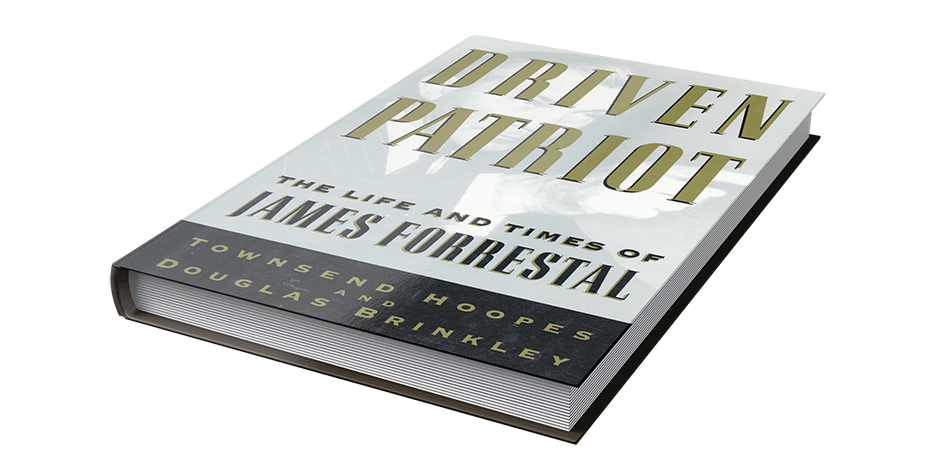A haunting portrait of one of the most fascinating and influential figures of the mid-twentieth century, this biography takes a penetrating look at James Forrestal’s life and work. Brilliant, ambitious, glamorous, yet a perpetual outsider, Forrestal forged a career that took him from his working-class origins to the social and financial stratosphere of Wall Street, and from there to policy making in Washington. As secretary of the navy during World War II, he was the principal architect in transforming an obsolescent navy into the largest, most formidable naval force in history. After the war, as the nation’s first secretary of defense, he played a major role in shaping the anti-Communist consensus that sustained the U.S. policy of containment during the Cold War. Despite his many achievements, Forrestal’s life ended in tragedy with his suicide in 1949.
This absorbing study not only takes an understanding look at this complicated man but presents an authoritative history of the tumultuous years of America’s rise to the world primacy. Winner of the 1992 Roosevelt Naval History Prize, the book enjoyed wide acclaim when first published and is now considered a definitive work.
This engrossing biography recounts the life of one of twentieth-century America’s most celebrated — through ultimately tragic — public figures, a man who mastered both Wall Street and Washington. James Forrestal was a brilliant financier and military organizer, and he was the first United States Secretary of Defense.
Townsend Hoopes and Douglas Brinkley follow Forrestal through his Irish upbringing in upstate New York — he was the son of immigrants — through Princeton University to his success on Wall Street during the Roaring Twenties, to his Gatsbyan life of privilege on Long Island, to his pivotal role in rebuilding the obsolescent U.S. Navy during World War II, to his career as the architect of the national security state, and, finally, to his collapse and suicide at the age of fifty-seven.
The authors portray Forrestal’s large and crucial role in American efforts to complete the military victory of World War II, restore a shattered postwar world, and confront the ominous new Soviet challenge. But they also describe the bitter inter-service rivalry over the unification of the armed services, and how the savage attacks on Forrestal by columnists Drew Pearson and Walter Winchell, as well as rebellious navy and air force officers, led to his descent into paranoia and self-destruction. In the end he became prey to hallucinations and distressingly erratic conduct, and was relieved by President Truman from a job that had become his life support system. A few months later he jumped from a window of Bethesda Naval Hospital.
Hoopes and Brinkley probe deeply into Forrestal’s contradictory inner life — his unfortunate marriage to Josephine Ogden, an intelligent but troubled and willful alcoholic; his cynical attitude toward society and wealth, yet his eagerness to embrace all their trappings; his inability to deal with adversity; his complex, elusive personality, which made it impossible for him to truly love another human being. Interwoven through the text are vivid portraits of Forrestal’s contemporaries: Franklin Roosevelt, Admiral Ernest King, Harry S. Truman, George Kennan, Stuart Symington, the bankers Clarence Dillon and Ferdinand Eberstadt.
Publisher
Knopf Publishers
Published
May 5th, 1992
Formats and Editions
Hardback
Paperback
eBook
Audio
Purchase book at these available locations:
Praise for Driven Patriot:
“A grand epic biography.” — The Wall Street Journal
“James Forrestal was one of the most fascinating men of his time, and one of the most important. This is a first-rate and much-needed biography.” — David McCullough
“Driven Patriot is not only a sensitive and understanding portrait of a great and many-sided man tortured by his unavoidable responsibilities. It is also a distinguished history of the great but troubled years during which the United States, with Forrestal’s help, rose to world primacy.” — Paul H. Nitze
“A grand and absorbing biography…that describes a life that was at once a great American success story and a great American tragedy.” — John Morton Blum
“An American classic.” — Robert J. Donovan
“An illuminating and haunting book that will surely stand as the definitive account of James Forrestal’s triumphant yet tragic life.” — New York Times Book Review

